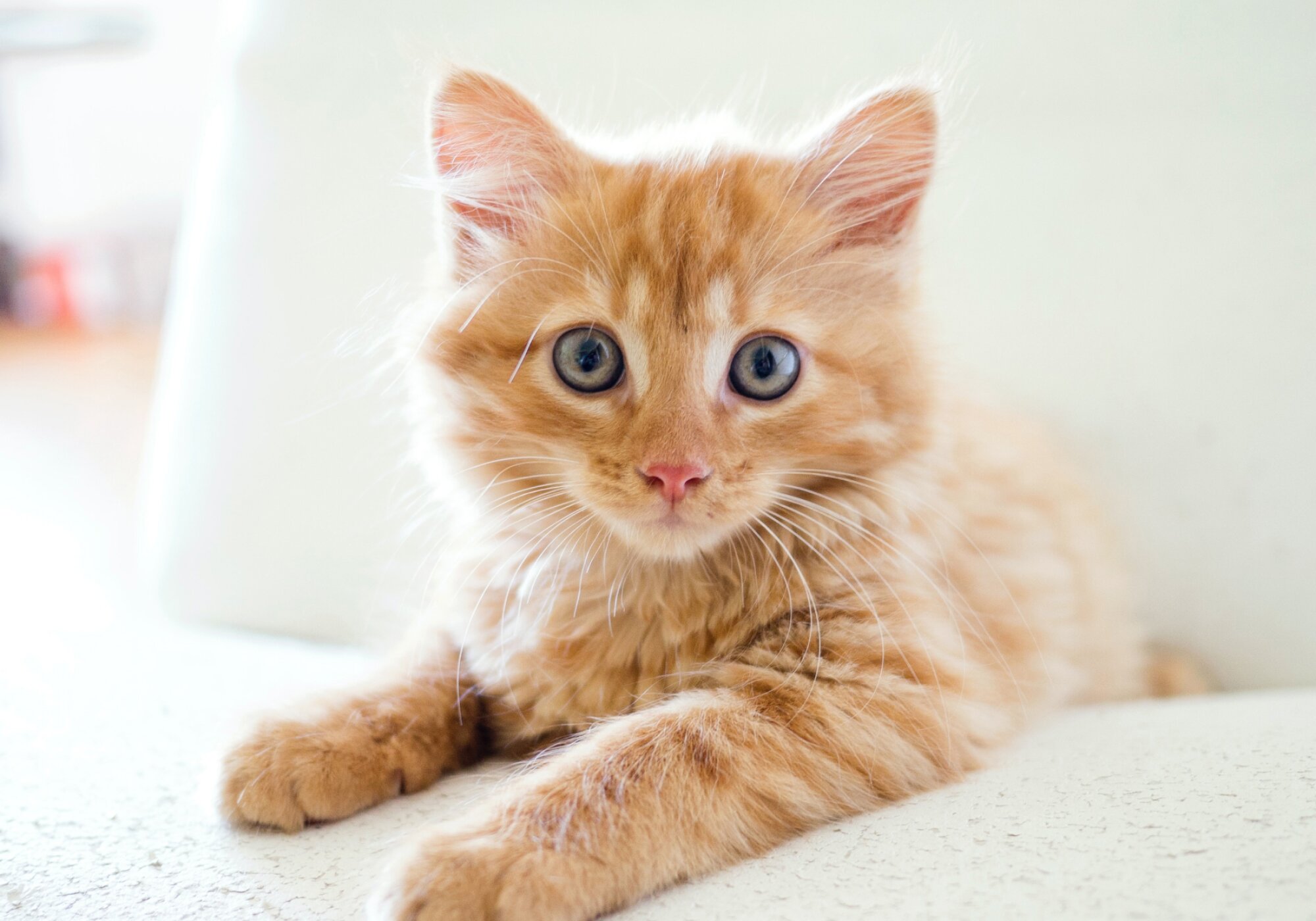Cats are known for their quirky, sometimes unpredictable behavior. Aside from purrs and meows, your cat may show some unique behaviors.
Understanding cat behavior can be tricky. But, knowing why your cat behaves in certain ways may help you identify their specific needs and possible health issues.
In this article, we'll cover:
- Reasons cats act out
- Cat behaviors by life stage
- 5 ways to improve your cat's behavior
Reasons cats act out

Cats have unique behaviors that set them apart from other pets. It’s helpful to understand these strange cat behaviors to keep your cat healthy and happy.
Cats can act out for many reasons, including:
- Aging
- Stress and anxiety
- Illness
- Changes in their environment
- Boredom
Cat behaviors by age

Experiencing different life stages with your cat is a rewarding part of being a pet parent. But, your cat’s behavior can change as they age.
Here are some common behaviors in kittens, adult cats, mature cats, and geriatric cats for all breeds.
Kittens
Kittens are in their 'junior' stage from 6 months to two years old. As a kitten, your furry friend may have boundless energy and get into trouble. Here are some common behaviors in kittens:
Cat zoomies
Like other pets at a young age, kittens can have lots of energy. In fact, kittens often appear to be bouncing off the walls, jumping across furniture, and running around your house. Cat zoomies are normal for young kittens.
Knocking things over
As your cat matures and becomes curious about things in their environment, they may become curious. Cats have sensitive paws and tend to swat things to check them out. Apart from their natural instinct to swat things, cats also knock things over for attention.
Adult cats
As your cat ages past the kitten stage, you may notice some behavioral changes. Adult cats (around 3-6 years old) have reached sexual maturity, and are usually more interested in interacting with other cats.
Here are some common behaviors in adult cats:
Rubbing their head on things
Have you ever noticed your cat rubbing their head, ears, and face on furniture, walls, or your clothes? Cats rub their head on objects as a way of marking their territory and showing affection.
When a cat presses their face into an object, they release facial pheromones. These pheromones help cats recognize safe spaces and people in their environment.
Chirping, chattering, and yowling
Adult cats chirp, chatter, and yowl when they feel excitement and frustration. Your cat may make any of these sounds while playing, watching a bird, or interacting with other pets.
Chewing unusual objects
Chewing on things like blankets, socks, electrical cords, or plants is a behavior observed in some cats. Boredom, anxiety, and illness can trigger this habit.
Kittens may also chew unusual objects. This is because baby cats who weaned too early after birth may have a tendency to "nurse" on soft items in your home.
This habit can lead to choking, intestinal blockages, and other health problems. If you notice your cat chewing unusual objects, hide the object, and talk to your vet.
Mature cats
Mature cats (around 7-10 years old) have likely grown out of their energetic life stages. Cats in the mature stage are the human equivalent of around 40 years old.
Here are some common behaviors in mature cats:
Avoiding their litter box
There are a few reasons why an older cat may avoid their litter box:
- It isn't clean
- It isn't easily accessible
- It is in a high-traffic area
- They share it with another cat
Cat parents should have one litter box per cat. Place them in a semi-private location and ensure they stay clean.
If you have a senior cat, they may struggle to access a litter box with high walls. Consider a location that is easy to access or find one with lower sides.
Kneading
You may have noticed your cat 'kneading' things with their paws. Kneading is a natural behavior for a cat that stems from their time as a baby.
When cats are born, they press on their nursing mother's stomach to stimulate milk flow. As adults, cats 'knead' when they feel relaxed and happy.
Kneading isn't a problem unless your kitty's claws are digging into your legs or furniture. If so, learn how to trim your pet's nails with nail clippers and safely trim them down.
Giving gifts
Has your cat ever brought you an unwanted gift, like a dead bird or mouse? Like dogs, cats bring their humans gifts to show affection.
Giving gifts is a normal behavior for cats. But, you may not want to encourage this adult cat habit.
So, avoid scolding or praising your feline friend for bringing you a gift. Simply dispose of the thoughtful gift safely and consider keeping your cat indoors.
Senior cats
Senior cats (around 11-14 years old) are in their geriatric stage. If you have a geriatric cat, you may have seen some unique behavioral changes as your cat has aged.
Here are some common behaviors in senior cats:
Restlessness
Staying up at night is a normal behavior for cats, but it can be disruptive to those trying to sleep. Geriatric cats may get restless if they lack enrichment and exercise during the day.
Pet parents can also try adding a small meal to their cat's feeding schedule right before bedtime to make them tired. Be sure their cat food is nutritious and makes them feel good.
Excessive meowing
Excessive meowing is a common sign of pain, and geriatric cats are less active and more prone to painful health issues like:
- Arthritis
- Dental disease
- Diabetes
- Urinary tract infections
Meowing all night instead of sleeping may also be a sign of pain or dementia. In this case, your senior cat may need medical attention and treatment. Provide the best care for your cat by visiting your veterinarian for regular cat check-ups.
5 ways to improve adult cat behavior

While most seemingly unusual behavior is natural for cats, there may be some adult cat behaviors humans want to limit. Depending on the habit, there are some simple fixes pet parents can try.
1. Try a calming pheromone diffuser.

Developed by scientists and tested by vets, calming diffusers reduce fear, anxiety, and stress-related behaviors in cats and dogs. Pheromone diffusers are a great option for felines struggling with stress and anxiety in all life stages.
Pheromone diffusers mimic natural pheromones to promote bonding in new homes. They reduce litter box aggression in multi-cat households and anxious behaviors like marking, meowing, and scratching.
Place a pheromone diffuser by your pet's cat bed or in their safe space. You can also use it in the car while traveling. Make sure it’s out of reach of your cat to avoid spills.
2. Provide daily enrichment.

Some cats require special attention and need more enrichment than others. To keep your kitty's life interesting and limit energy spurts and cat zoomies, provide plenty of exercise and daily enrichment.
Toys, catnip, and simple items like cardboard boxes can add enrichment to your cat's life. Another simple way to add enrichment to your cat's life is by adding a cat tree to your home.
If your cat loves watching birds through the window, consider adding a cat tree to your space by a window. Plus, cat trees give your kitty a safe, small space to sleep and hide in times of stress.
3. Put away breakables and plants.

Pet parents can curb behaviors like knocking things over and chewing plants by putting away breakables and keeping their adult cat off of shelves and counters. Hiding electrical cords and other dangerous household items can also keep your kitty safe.
Some plants are poisonous to cats. For a comprehensive list of which plants to avoid in your home, check out our helpful guide.
4. Add training to their routine.

Tricks aren't just for dogs. Pet parents can teach a cat tricks for obedience like:
- Sit
- Stay
- Come
- Paw
- Spin
Trick training strengthens your bond with your pet and combats boredom behaviors. Plus, training supports their mental and cognitive health.
5. Take them to the vet for regular check-ups.

A healthy kitty is a happy kitty. Keeping your cat's health in tip-top shape may limit behaviors associated with health issues.
Visit your veterinarian every six months to a year for a cat check-up. With regular check-ups, your vet may be able to identify any medical issues or nutritional needs before your cat's behavior becomes uncommon.



